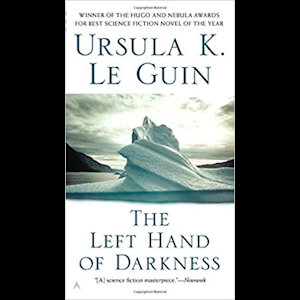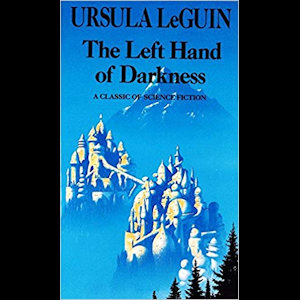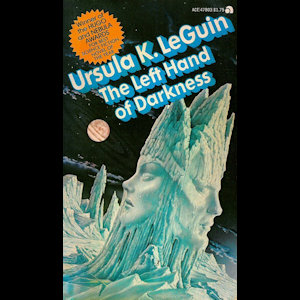The Left Hand of Darkness by Ursula K. Le Guin - Sci-Fi Classic Review
 | | Is it just me, or does this look like the cover of a self-help book? |
When discussing the greats of science-fiction literature, it would be a crime to exclude the late Ursula K. Le Guin, one of the grandmasters of using sci-fi to explore social psychology and futurist politics. My first encounter with her work was in high school, in which her novel The Left Hand of Darkness was the only science-fiction novel on a list of potential summer reading requirements. I have gone on to read much more, but that first encounter left an indelible mark on me. The Left Hand of Darkness gave me a glimpse of what sci-fi is capable of when it applies itself to weighty, heady issues that would be difficult--if not impossible--to explore in any other genre.
We open on the distant world of Gethen, an icy planet populated by an odd offshoot of humanity that is ambisexual, meaning that they are not biologically fixed to a specific gender. Our protagonist, Genly Ai, is an alien to this place, a human male. He has been sent to pursuade the various governments of Gethen to join the Ekumen, a confederation of planets that seeks to peacefully trade goods and knowledge with every society it finds among the stars. He quickly finds his closest advocate, Estraven, exiled for treason by a mad king and must discretely flee to other countries where he learns more about Gethen society. Eventually reuniting with Estraven in a country that has no problem putting Ai in a concentration camp, the pair must overcome their psychological differences as they make a desperate, months-long trek across a lifeless glacier in order to escape the prejudices of a few closed-minded beaurocrats and prove Ai's case before the world.
This is a novel that rests confidently on the border between science-fiction and fantasy, bringing elements of each to bear on a complex tale with a clear and fitting message: coming together is more powerful than pushing apart. Renowned for its profoundly forward-thinking sociopolitics--this male-dominated genre novel written by a woman that has a dark-skinned protagonist and deals with provocative issues of gender identity and sexuality was published in 1969--The Left Hand of Darkness remains as important and meaningful as ever. But it's not just the message that's noteworthy; this is one hell of a well-written book.
 | | It's so blue |
Despite being one of a series of novels known collectively as the "Hainish Cycle," this story stands on its own, and no knowledge of the previous or succeeding stories is needed to understand and appreciate it. Le Guin is a master at giving you information in a natural, efficient way that never bogs down the narrative or leaves the reader needlessly confused. A lesser writer would get lost in the details or forsake them altogether, but Le Guin knows which details are important and how to explain them well in as few words as possible. That said, she also has no problem dropping readers feet-first into the deep end, and in a typical Le Guin novel, the first chapter or two is the most difficult.
It is astonishing, then, to look back at The Left Hand of Darkness and realize just how complex and fully realized the world of Gethen is. It's not a long novel, but it effortlessly expounds upon an entire worlds' worth of different ways of life. Two different alien religions are described, and the separate political arrangements of two different countries play pivotal roles in the main plot. Most sci-fi that deals in different worlds tend to treat entire planets as though they each consist of one homogynous culture, but Le Guin doesn't take the lazy way out.
She also isn't afraid to let her futuristic conjectures get a little ambiguous. When describing the oddities of life on Gethen--such as the strange fact that the different countries have never gone into open war with one another despite their many conflicts--she never claims that the reasons for these oddities rest solely on the thing that makes the humans there so unique: their ambisexuality. As with Wells in The Time Machine, she offers this as a potential explanation, but when thinking about it on the page, Ai hesitates to conclude that the correlation is absolute. Still, it's hard not to see how she's elaborating on how completely alien concepts of gender would affect individual psychology as well as global society. (It's also hard not to notice all the Taoist inspirations once you learn how much Le Guin admired Lao Tzu.)
 | | Definitely my favorite cover |
This is where Le Guin demonstrates the power of speculative fiction. No other genre could explore gender in such a free and interesting way without being deeply offensive or disingenuous about it. It's probably the only reason Le Guin was able to get her radical ideas published well before our modern age of transgender politics. But the most remarkable thing about it is that her conclusions are not judgmental or harsh. Indeed, she sees as many flaws and problems with ambisexual society as there are in our bisexual one. The Gethen are neither superior nor inferior, and Le Guin writes as though the very idea of a superior or an inferior society borders on being morally abhorrent. She simply reflects back to the reader how our own sexuality determines our reality, and that's something she wouldn't be able to do if this were anything but a science-fiction fantasy.
There are things to nitpick about the novel, though. If you are looking for something to offend progressive sensibilities, there are a few lines in there about homosexuality that haven't aged particularly well. (Le Guin apologized for this many years after the book's publication.) The initial relationship between Ai and Estraven is poorly handled; Le Guin explains that Ai distrusts Estraven but never really shows us why, despite how integral this is to the book's final chapters. Also, the long trek across the ice goes on very long, and it's exhausting. That's probably what she was going for, of course, but it does slow things down at exactly the moment they should be speeding to a climax.
On the other hand, there are a lot of little things to love. My personal favorites include the way Le Guin sprinkles just enough information about Estraven's backstory for attentive readers to piece together, the occasional chapter devoted to an interesting Gethen parable, and the way she switches first-person POV between Ai and Estraven so that their eventual coming together is that much more powerful. As a work of literature, The Left Hand of Darkness at first blush may look odd on a shelf alongside Shakespeare, Austen, and Tolstoy. However, it is every bit as brilliant and important, a work of science-fiction that absolutely cannot be dismissed as mere genre fodder. Rest assured, this is not the only novel by Ursula Le Guin I intend to cover.
-e. magill 9/20/2018
|
|